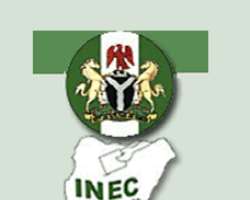VOTER REGISTER: BEFORE WE BUNGLE 2011

The recent advice to Prof Jega by one of the civil society elements that had goaded him on to dump the existing voter register was definitely from the most unlikely quarters. Bamidele Atulu told Jega at a widely reported press conference to recourse to the old register.
But that was not the first time such wise counsel would come Jega's way. The International Foundation of Electoral System (IFES) and the UNDP also warned INEC in July on the consequences of undertaking such a delicate element of election as voter registration in a hurried manner capable of bungling the 2011 election.
Both international bodies advised INEC to instead clean up and deploy the existing one. But Jega said he could deliver once he had the money.
But the whole thing never made sense to be from morning and I never hid my thoughts. In fact, my opinion piece entitled 'Voter Regis: Before We Blow N74bn' was published by several national dailies. In the version published by the Tribune of 12th August 2010, for instance, I had unequivocally contended that 'The forthcoming voter registration exercise, proposed by the Independent National Electoral Commission (INEC), will definitely go down in history as the most expensive and wasteful of its kind, not just in Nigeria, but anywhere in the whole wide world.'
I had sited the case of Bangladesh, a developing country like ours that has toppled Nigeria severally on the Transparency International corruption table. Yet she compiled an internationally celebrated voter register such that even Jega promised reporters ours would be fashioned after it. But that obviously would be excepting the cost because while Afghanistan spent $65million (about N9.7bn in our local currency) to register 80 million voters, Jega's targeted to register 70 million voters (10 million voters less than the 80 million of Bangladesh) at a cost difference of N64.3bn and a whooping 600 per cent increase (based on the initial request of N74billion.
N ote that the current Canadian voter register/data sharing system cost her about 19.2 million Canadian dollars to register 23 million voters. I used Yahoo then to convert it to USD (US Dollars) and it amounted to USD18,897,6378. That is about N2, 872,440,976 (N2.8bn) at a benevolent exchange rate of N152 per dollar. If you multiply the Canadian voters' figure of 23 million by 3, you will get 69 million voters. That is one million short of the 70 million we are targeting. That gives an approximate of N8.6bn. I was generous enough to round it off at N15bn, to cover the one million and the cost of alternative power sources, cost of importation and logistics, yet I found out that even if such generosity was upped to N20bn, it was still a far cry from the then N74bn in question.
Also, the war-torn Afghanistan's voter registration before the 2004 election was described by the Administration and Cost of Election (ACE) as particularly complicated and even hazardous. Afghanistan didn't have idea of the size of electorate and ownership of national identity card was very limited. Worse still, security situation was so bad that all registration centres had to have communications (satellite phones in most cases) and military guards. The voter registration was tagged, the single most expensive component of the entire electoral processes. In all, Afghanistan spent $74 million, amounting to N11.248bn.
I further called attention to the fact that with Jega's estimate of N74Bn, we would be spending about 10 times what it costs India to register a voter.
I warned that Jega could not be too sure of the time frame he kept assuring Nigerians of since we neither produce locally nor in control of any of the technologies being proposed. I complained that we were setting a tight timeline for something we weren't in control of, and at an offensive cost too, even when a 'perfect register' would not guarantee a free and fair election unless stakeholders played by the rules.
Jega should listen to Bamidele Atulu and end this ego trip unless all the dilly dally are part of a game plan and subterfuge to derail and or delay the handover date. Who knows.
•Zakari Inusa,
Public Analyst, Kaduna.
